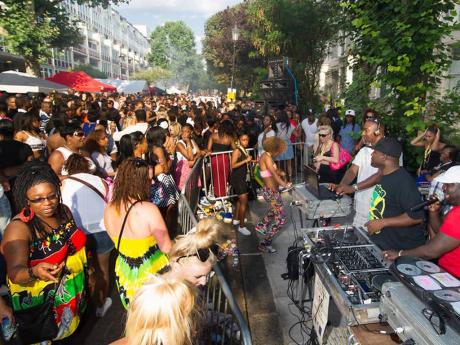London gets ready for Notting Hill Carnival weekend
LONDON:
London is gearing up to host Europe’s biggest street festival with the Notting Hill Caribbean Carnival, set for Bank Holiday weekend, Sunday and Monday, August 27 and 28.
Steel bands, costumes, food stalls, sound systems and hundreds of thousands of spectators will take to the streets of west London in a colourful, energetic procession that has become a tradition and cultural melting pot for all to enjoy. More than a million visitors are expected over the two days.
After making a successful return last year following its absence during the 2020 and 2021 pandemic period, the two-day street festival will showcase a kaleidoscope of costumed bands, colourful floats, stage shows with numerous Caribbean artistes, and sound systems at strategic points throughout the three-mile carnival route.
The street parade will start with the families and children’s day on Sunday and followed by the adults’ day on Monday. The festivities, however, will actually kick off on Saturday, August 26, with the UK National Panorama Steel Band Competition.
Matthew Phillips, CEO of Carnival Village Trust, which manages the carnival, noted that the 75th anniversary of the Windrush generation in Britain will be reflected in this year’s programme.
He said: “It’s a momentous occasion that allows us to reflect on the tremendous contribution and enduring legacy of the Windrush generation to Britain.
“The Caribbean pioneers brought with them not only their talents, skills and work ethic, but also their vibrant cultures and indomitable spirit. They help rebuild post-war Britain, enriching our society with their traditions, music and food, leaving an indelible mark on our collective identity.”
He added: “The Notting Hill Carnival, with its message of unity and inclusivity, serves as a powerful reminder of our shared responsibility to create a just society. Let’s make this year’s Notting Hill Carnival a resounding tribute to the Windrush generation and a testament to the power of unity and inclusion.”
SOUND SYSTEM CULTURE
One of the enduring features of the Notting Hill Carnival is the costumed bands, and, once again, many will be vying for the title of Best Designed Masquerade Band when they pass the judging point on Great Western Road.
Among those taking part this year are Arawak, Arts-a-Light Mas, Bacchanalia, Calabash Carnival Club, Chocolate Nation Mas, Clement James Carnival Band, Caribbean Sessions Mas, Dynamic Mas, D Riddim Tribe, Exotic Mas, Ebony Mas Band, Elite Mas, Flagz Mas Band, Flamboyan Carnival Arts, Glorious Backstage Arts, Hype Mas, Invaders Mas, KarnivalMania, Lagniappe, Masquerade 2K, Oxypower Mas, People of Paradise Arts, Soco Massive, Tropical Isles and Utopia Mas UK.
The history of the Notting Hill Carnival has been celebrated over many periods. The first Caribbean carnival in the UK took place in 1959 in St Pancras Town Hall, Islington, as a response to the racial tension in London at the time. The previous year saw the Notting Hill Race Riots, where hundreds of racist attacks were carried out on West Indian homes in the area.
Then, in 1964, Rhaune Laslett and Andre Shervington organised a children’s street party – recognised as the first Notting Hill Carnival, which predominantly focused on Trinidadian carnival culture and practices like J’Ouvert.
But it was in 1973 that Trinidad-born community activist and writer Leslie ‘Teacher’ Palmer expanded and developed upon the original structure of Notting Hill Carnival, by making it more inclusive of all Caribbean islands, as well as striving to include more Britain-born black youth.
Palmer had the idea to incorporate more urban black music and artistic expressions into the cultural event once he was appointed as director of the carnival in 1973. He was able to greatly transform the carnival by introducing stationary sound systems, separate from the ones on moving floats, Mas bands, and other elements that were prominent in West Indian carnivals back home, such as food stalls offering traditional Caribbean cuisine and memorabilia.
With the sound-system culture broadening the styles of music played at the carnival, the public celebration of Caribbean culture grew in popularity.
URBAN FESTIVAL
Historian Tom Vague wrote in his 2009 book 50 Years of Carnival: “Under the administration of Leslie Palmer, the Notting Hill Peoples’ Carnival was transformed into an urban festival of black music, incorporating all aspects of Trinidad’s carnival. It brought more sponsorship, recruiting more steel bands, reggae groups and sound systems, introducing generators and extending the route. Attendance increased from 3,000 at the beginning of the 1970s to 30–50,000.”
Carnival Village Trust CEO Phillips confirmed that sound systems and Mas bands “marked an evolution in the event that helped ensure its future, so this is something worth celebrating 50 years after it was introduced”.
Among the popular sound systems expected to take part are King Tubby’s, Gladdy Wax, Channel One, G.I Roadshow, Lord Gellys, Killerwatt, Mark Ross The Boss, Metro Glory, Rampage Sound, Rapattcak, Platinum Soul Sound, Saxon, Sir Lloyd and Volcano.

